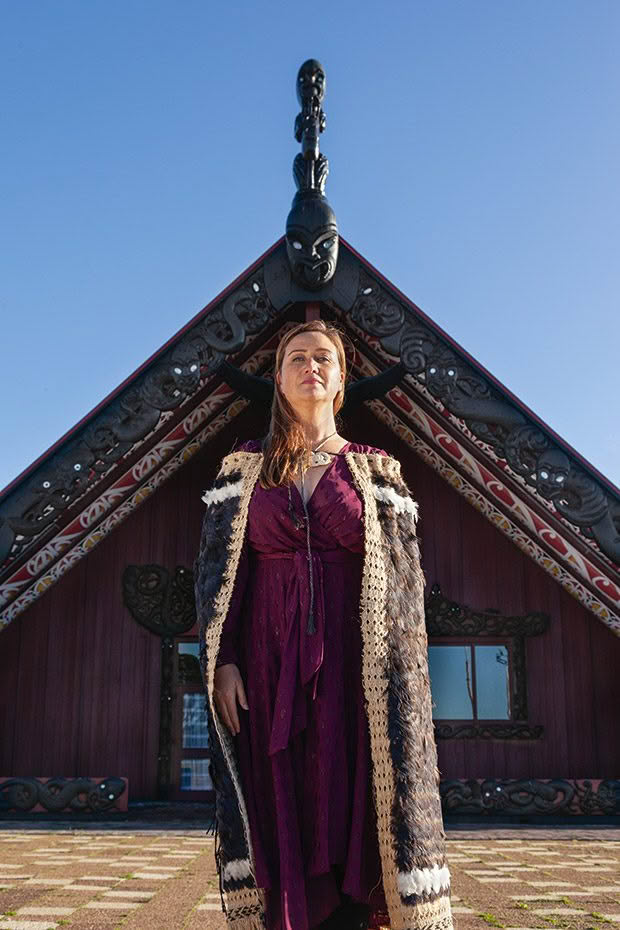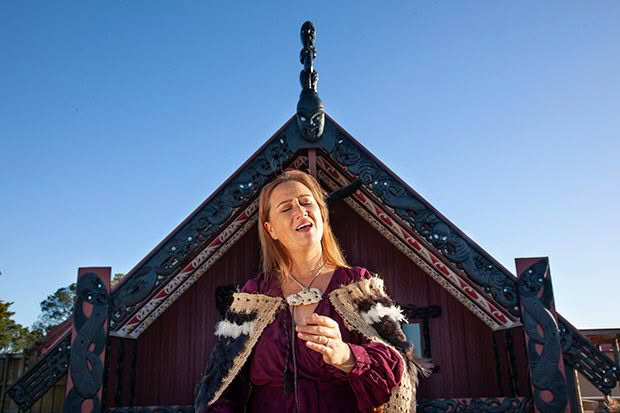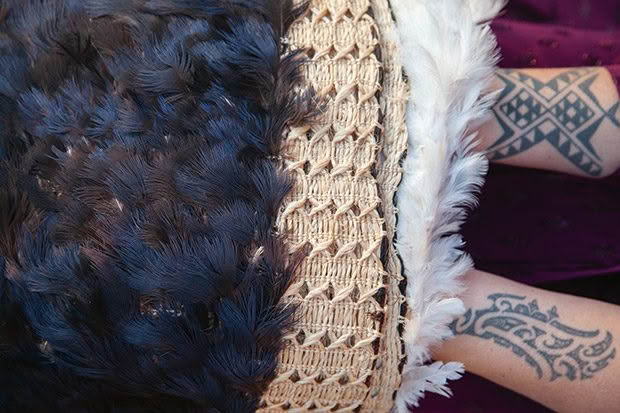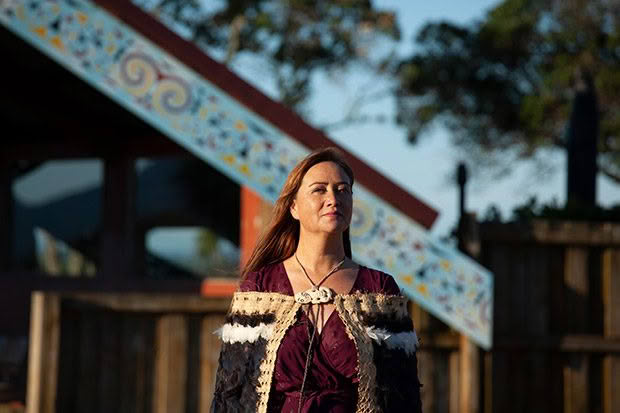Lawyer Precious Clark helps enrich lives with Māori culture through training programme Te Kaa

Lawyer Precious Clark takes a lead role in helping Pākehā identify with Māori culture in a way that adds value personally and professionally.
Words: Amokura Panoho Photos: Rebecca Swan
PEPEHA
Ko Ranginui kei runga, ko Papatūanuku kei raro, ko mātou kei waenganui, tihei mauri ora.
I te taha o tōku māmā, he uri ahau ō Ngāti Whātua, Te Uri o Hau, Waikato me Ngāti Hē.
Kei Ōrākei taku tūrangawaewae, nō reira ko Maungakiekie te maunga, ko Waitematā te moana.
Ko Māhuhu-ki-te-rangi te waka.
Ko Te Taoū, Te Uringutu, me Ngā Oho ngā hapū.
Ko Te Kawau te Tangata.
Ko Ōrākei te Marae.
Ko Takaparawhau te whenua taurikura.
Nō te Whānau Hawke ahau.
I te taha o tōku pāpā, He fifth-generation Pākehā ahau nō ngā whenua o Kōtimana me Ingarangi.
Ko Patu rāua ko Nobby ōku mātua.
Ko Numa Mackenzie tōku hoa rangatira, nō ngā motu o Kuki Airani.
Ko Taiaaria rāua ko Rongomai a māua tamariki.
To our Sky Father above, our Earth Mother below, to all of us here together, I make this call.
On my mother’s side, I am a descendant of Ngāti Whātua, Te Uri o Hau, Waikato and Ngāti Hē.
Ōrākei is my place to stand, Maungakiekie my mountain, Waitematā my sea.
I belong to the waka Māhuhu-ki-te-rangi.
Te Taoū, Te Uringutu and Ngā Oho are my
sub-tribes.
Te Kawau is my ancestor, Ōrākei is my marae, Takaparawhau our prosperous land.
I am a member of the Hawke family.
On my father’s side, I am a fifth-generation Pākehā originally from Scotland and England.
My parents are Patu and Nobby.
My husband is Numa Mackenzie, and he is from the island, Mangaia.
We have two children, Taiaaria and Rongomai.
Precious Clark was born in the middle of her tribe’s hard-fought occupation of Bastion Point/Takaparawhau. Her grandfather, Eruini Hawke, often remarked to Precious’ pregnant mother, Patu, that her unborn baby was precious. The struggle of her iwi, Ngāti Whātua Ōrākei, has shaped Precious’ life and now she embraces service to the tribe’s mana motuhake (self-determination).
WHAT IS YOUR CURRENT ROLE?
My legal career, specializing in public policy, began in Wellington with the Ministry of Economic Development, then the Ministry of Forestry and Agriculture under the guidance of the respected senior Māori civil servant, George Ria. In 2004, I moved to London to work for the British Security Industry Authority to advise on human-resources policy and multi-million dollar contract negotiations.

On my return, in 2012 I became a director of Ngāti Whātua Ōrākei Whai Rawa, the investment arm of the iwi. In 2017, I was elected to the iwi board, was appointed a director of the Auckland Regional Amenities Funding Board and became chair of Te Tira Kautū – the advisory committee to the Southern Cross Health Society.
My business, Maurea Consulting, delivers Te Kaa, a training programme to help 10,000 people positively identify with Māori culture and understand their place as Tangata Tiriti (Treaty partner) in a way that adds value to their personal and professional lives.
WHO AND WHAT WERE THE MOST FORMATIVE INFLUENCES IN YOUR LIFE?
My mother’s brother, Joe Hawke, is a massive force in my life. During his leadership of our iwi and time as an MP he supported my growth and development. As a teenager I traveled to the Commonwealth Games in Canada with Sir Hugh Kawharu and many of my elders. It was invaluable to be in the company of these learned people for an extended period, taking the mauri (spiritual essence) to the indigenous peoples of British Columbia after having hosted the games in Auckland in 1990.
The next significant occasion was meeting Nelson Mandela in 1995 at St Matthew-in-the-City, where Uncle Joe asked me to participate in the karanga (call) to this incredible world leader. I remember Nelson Mandela bathing us in his light and imagined, ‘If I could do the same in my leadership capability what an impact I could have on the world.’

The Māori women teachers at Kahurangi ki Maungawhau (Auckland Girls Grammar) helped me craft my voice. Rahera Shortland was phenomenal in the way she taught us Te Reo. The head of the Māori Unit was the formidable Arapera Blank (Mā Blank), an esteemed poet and the first Māori writer to win a Katherine Mansfield award. They taught us the mana we have as wāhine through role modeling, conversations and encouraging us to have a differing opinion, to be brave and see our potential.
WHAT DOES THE CALL FOR LEADERSHIP MEAN TO YOU?
I had the benefit of growing up in a loving blended family. It was growing up in Grey Lynn, within a predominantly Pacific community, where I learnt Samoan before Māori and Cook Island dance before kapa haka. My childhood ingrained in me the value of service and how to serve.
At college, I became aware of how familiar the story of land confiscation – something I had been born into at Bastion Point – was, that our experience wasn’t unique in the country’s colonial history. I realized how little I knew of the sacrifice and leadership needed to overcome such hurdles.
This sent me to study law at Auckland University, with a special interest in intellectual property, and to join the Māori student movement, Ngā Tauira Māori. Many of my cohorts now hold influential positions either as tribal leaders, judges, journalists, and even politicians. It was a great time, where we have emerged as the hua (fruit) born from the sacrifice of those who went before us.

While still at university, my late uncle Rocky Hawke asked me to step up to a more formal leadership role, telling me that the hawk bird (kārearea) would be a kaitiaki (guardian) to look after and guide me. I wasn’t ready to take on that role. However, subsequently, when traveling on a bus in New Mexico with indigenous film-maker Bird Running Water, I told him the story. He said: “Look out the window… like that hawk?”
The beauty of Te Ao Māori (Māori worldview) is that you have these guardians around you even when your eyes aren’t open, but your responsibility is to monitor your behaviour so that you don’t subject them to unnecessary burdens. Moments like seeing the hawk in New Mexico prompted my return home.
WHAT ARE THE GOALS FOR YOUR PEOPLE?
We have a saying, “Ngāti Whātua heru hāpai.” Ngāti Whātua, who stand proudly wearing a heru (a carved ornamental whalebone hairpiece), indicating our tribal authority and mana (esteem). Our aspiration is for our whānau to be uplifting and affirming leaders within Tāmaki Makaurau. For example, our paepae (speakers), our kaikaranga (callers), our mātauranga reo (language experts) are 100 strong in each area.
Another legacy goal is re-energizing the mauri of our natural environment by planting a forest on the majority of the land returned under the Ōrākei Act 1991 and our land at Pourewa, which runs down to the Ōrākei Basin. We will bring birdsong and wetlands to the middle of the city with spaces for camping, fires and storytelling, to allow all of our community to co-exist with the natural environment.
Just imagine that, in two decades, young children will be able to get on a bus to the ngahere (forest) in the middle of our city. Our goal is that we don’t need to tell people we are ahi kā (local tribal authority) but rather that it is recognized through our actions and the extension of our manaakitanga (care).
MORE HERE
Love this story? Subscribe now!
 This article first appeared in NZ Life & Leisure Magazine.
This article first appeared in NZ Life & Leisure Magazine.
